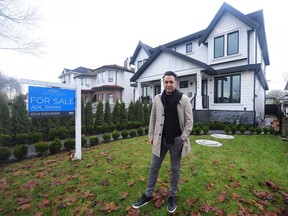Canada’s temporary ban on foreign purchases of residential real estate sends the world a mixed message just as this country is ramping up immigration, but few B.C. experts expect it to have a major effect in this province.
Real eState
Experts say foreign-buyer ban won’t bite B.C. real estate prices
B.C.’s hot markets have already cooled due to rising interest rates and the foreign-buyers tax has already deterred a number of foreign purchases

The measure, which Prime Minister Justin Trudeau’s government campaigned on in the last election as a means to reduce competition in an environment of soaring property prices, came into effect Jan. 1 and is set to remain for two years.
Regulations enacting the ban prohibit people who aren’t citizens or permanent residents from buying residential real estate, defined as buildings with fewer than three units, such as semi-detached homes, or condominiums.
It also doesn’t include properties worth less than $500,000 or those that are outside of major cities or so-called “census agglomeration areas,” with a core population of at least 10,000 people.
Canadian property markets, however, have slowed and property prices fallen due to higher interest rates.
And in B.C., the provincial foreign-buyers tax, now set at 20 per cent, has already reduced foreign purchases.
“It’s obviously a negative message in already what’s a fairly soft market, but remember, we already had such a deterrent,” with the 20-per-cent tax, Dinani said.
From the B.C. Real Estate Association’s perspective, the share of foreign buyers in B.C.’s market had fallen to less than half a per cent in the last two years, “so taking that down to zero doesn’t mean a whole lot,” said Brendon Ogmundson, the organization’s chief economist.
“At least one year during the pandemic, (we) essentially shut off immigration and shut off foreign investment, and we had record home sales and prices,” Ogmundson said. “So, clearly this is not that important a segment of the market. The ban is more politics than economics.”
Relocation experts worry that the measure will make it harder for bigger companies to recruit talent, particularly senior executives who have choices for where they want to work.
His organization lobbied government for a blanket exemption for anyone with a valid permit to work in Canada, or for transactions related to purchasing property for employee relocation. In a news release issued Dec. 21, the Council said the federal regulations don’t measure up.
In B.C., however, most skilled temporary foreign workers coming to the province rent before deciding where they might buy, Dinani said.
“Could it prevent some people from moving here if they can’t buy? I think so,” Dinani said. “But I think (that) is a smaller percentage.”
“I guess we’ll find out over the next year if we hit our immigration targets and we’re not having much of a problem in attracting people to Canada,” Ogmundson said.
Andy Yan, director of the City Program at Simon Fraser University said measures such as Canada’s temporary ban aren’t new. New Zealand, Australia, Hong Kong and Singapore have already put similar restrictions in place.
“Really, again, this is all the fact that we have just finally woken up to the fact that Canadian residential real estate occupies a global marketplace,” Yan said.
And he added that by focusing on buyers, it still doesn’t get at the influence that foreign capital has had on B.C. markets in particular.
Real eState
‘The Bidding War’ taps into Toronto’s real estate anxiety

‘The Bidding War’ is a play skewering Toronto’s real estate market via a story about a one-day bidding war over the city’s last affordable home. The cast and crew say it exposes how the housing crisis brings out “the worst in people.” (Nov. 12, 2024)
Real eState
Greater Toronto home sales jump in October after Bank of Canada rate cuts: board

TORONTO – The Toronto Regional Real Estate Board says home sales in October surged as buyers continued moving off the sidelines amid lower interest rates.
The board said 6,658 homes changed hands last month in the Greater Toronto Area, up 44.4 per cent compared with 4,611 in the same month last year. Sales were up 14 per cent from September on a seasonally adjusted basis.
The average selling price was up 1.1 per cent compared with a year earlier at $1,135,215. The composite benchmark price, meant to represent the typical home, was down 3.3 per cent year-over-year.
“While we are still early in the Bank of Canada’s rate cutting cycle, it definitely does appear that an increasing number of buyers moved off the sidelines and back into the marketplace in October,” said TRREB president Jennifer Pearce in a news release.
“The positive affordability picture brought about by lower borrowing costs and relatively flat home prices prompted this improvement in market activity.”
The Bank of Canada has slashed its key interest rate four times since June, including a half-percentage point cut on Oct. 23. The rate now stands at 3.75 per cent, down from the high of five per cent that deterred many would-be buyers from the housing market.
New listings last month totalled 15,328, up 4.3 per cent from a year earlier.
In the City of Toronto, there were 2,509 sales last month, a 37.6 per cent jump from October 2023. Throughout the rest of the GTA, home sales rose 48.9 per cent to 4,149.
The sales uptick is encouraging, said Cameron Forbes, general manager and broker for Re/Max Realtron Realty Inc., who added the figures for October were stronger than he anticipated.
“I thought they’d be up for sure, but not necessarily that much,” said Forbes.
“Obviously, the 50 basis points was certainly a great move in the right direction. I just thought it would take more to get things going.”
He said it shows confidence in the market is returning faster than expected, especially among existing homeowners looking for a new property.
“The average consumer who’s employed and may have been able to get some increases in their wages over the last little bit to make up some ground with inflation, I think they’re confident, so they’re looking in the market.
“The conditions are nice because you’ve got a little more time, you’ve got more choice, you’ve got fewer other buyers to compete against.”
All property types saw more sales in October compared with a year ago throughout the GTA.
Townhouses led the surge with 56.8 per cent more sales, followed by detached homes at 46.6 per cent and semi-detached homes at 44 per cent. There were 33.4 per cent more condos that changed hands year-over-year.
“Market conditions did tighten in October, but there is still a lot of inventory and therefore choice for homebuyers,” said TRREB chief market analyst Jason Mercer.
“This choice will keep home price growth moderate over the next few months. However, as inventory is absorbed and home construction continues to lag population growth, selling price growth will accelerate, likely as we move through the spring of 2025.”
This report by The Canadian Press was first published Nov. 6, 2024.
The Canadian Press. All rights reserved.
Real eState
Homelessness: Tiny home village to open next week in Halifax suburb

HALIFAX – A village of tiny homes is set to open next month in a Halifax suburb, the latest project by the provincial government to address homelessness.
Located in Lower Sackville, N.S., the tiny home community will house up to 34 people when the first 26 units open Nov. 4.
Another 35 people are scheduled to move in when construction on another 29 units should be complete in December, under a partnership between the province, the Halifax Regional Municipality, United Way Halifax, The Shaw Group and Dexter Construction.
The province invested $9.4 million to build the village and will contribute $935,000 annually for operating costs.
Residents have been chosen from a list of people experiencing homelessness maintained by the Affordable Housing Association of Nova Scotia.
They will pay rent that is tied to their income for a unit that is fully furnished with a private bathroom, shower and a kitchen equipped with a cooktop, small fridge and microwave.
The Atlantic Community Shelters Society will also provide support to residents, ranging from counselling and mental health supports to employment and educational services.
This report by The Canadian Press was first published Oct. 24, 2024.
The Canadian Press. All rights reserved.
-

 News4 hours ago
News4 hours agoRafael Nadal calls it an emotional day as he loses in the Davis Cup before retirement
-

 Investment20 hours ago
Investment20 hours agoTrade-X reviews: peculiarities of transactions on trading platform
-
News3 hours ago
Jimmy John’s opens its first Canadian location
-

 News19 hours ago
News19 hours agoForecasters issue ‘bomb cyclone’ warning for B.C., with 120 km/h winds predicted
-

 News21 hours ago
News21 hours agoDix out as health minister as Eby introduces a drastically reshaped B.C. NDP cabinet
-
Business3 hours ago
CANADIAN ACCOUNTANTS TELL ALL ON STATE OF SMB FINANCES IN NEW SURVEY
-

 News4 hours ago
News4 hours agoTampa Bay Rays say new St. Pete stadium is unlikely to be ready for 2028 season, if at all
-

 News4 hours ago
News4 hours agoWhat is a ‘bomb cyclone’?

















